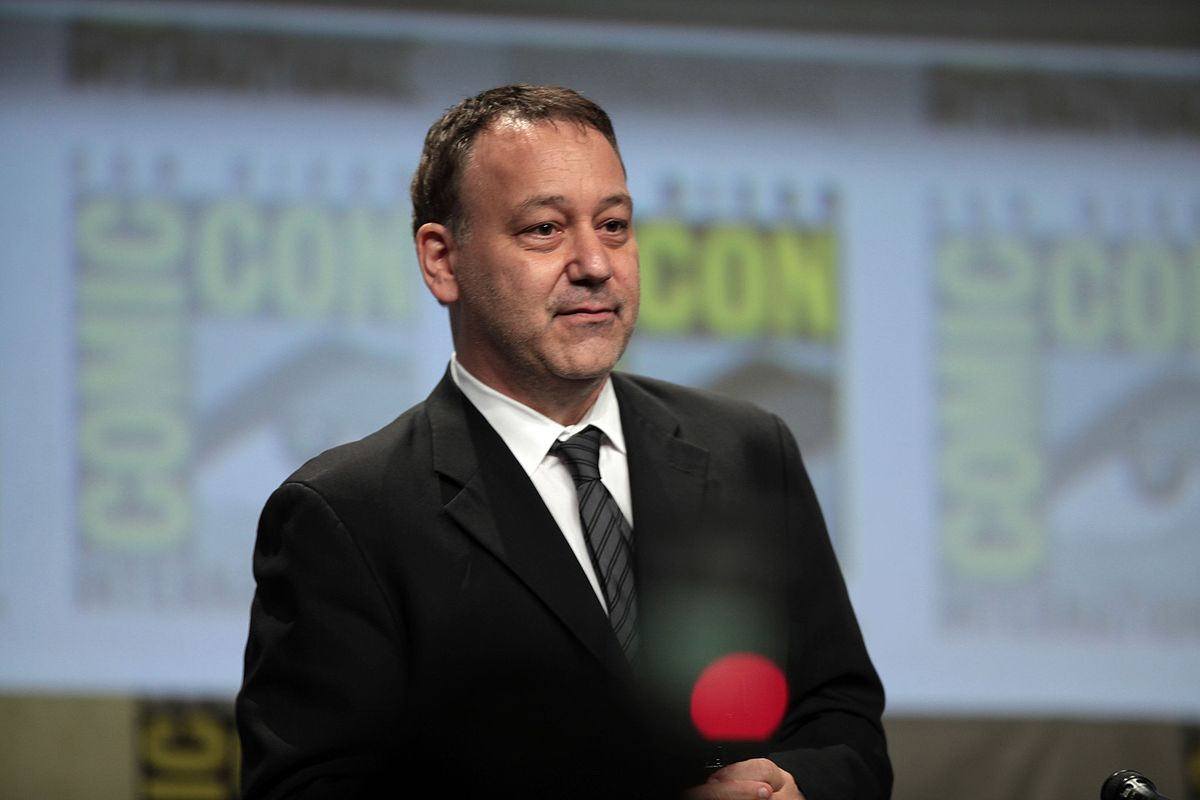Title of the work
Studio / Production Company
Country of the First Edition
Country/countries of popularity
Original Language
First Edition Date
First Edition Details
Season 6, Episode 1. Be Deviled. Directed by Mark Beesley; Written by Paul Robert Coyle. USA, Syndicated (MCA); September 27, 1999. 44 mins.
Season 6, Episode 8. Full Circle. Directed by Bruce Campbell; Written by Alex Kurtzman & Roberto Orci. USA, Syndicated (MCA); November 22, 1999. 44 mins.
Running time
Format
Date of the First DVD or VHS
Genre
Action and adventure fiction
B films
Mythological fiction
Television series
Target Audience
Crossover
Cover

We are still trying to obtain permission for posting the original cover.
Author of the Entry:
Joel Gordon, University of Otago, joel_gordon@hotmail.co.nz
Peer-reviewer of the Entry:
Elizabeth Hale, University of New England, ehale@une.edu.au
Lisa Maurice, Bar-Ilan University, lisa.maurice@biu.ac.il

Sam Raimi by Gage Skidmore. Retrieved from Wikimedia Commons, licensed under CCBY-SA 2.0 (accessed: December 30, 2021).
Sam Raimi
, b. 1959
(Producer)
Sam Raimi is an American filmmaker, actor and producer. He was born in Michigan (USA), to a conservative Jewish family, and attended Michigan State University. His career has been closely linked with that of Robert Tapert. Although Raimi intended to major in English, he chose to put his studies on hold in order to work on the feature film The Evil Dead (1981), after the success of his first co-operative production with Robert Tapert, The Happy Valley Kid (1977). Raimi is a co-founder of both Renaissance Pictures and Ghost House Pictures (see above). His solo-directorial work (distinct from productions with Tapert) include the original Spider-man trilogy (2002–2007) starring Tobey Macquire, and, most recently, Oz the Great and Powerful (2013). His most recent solo-producer role was for the crime-thriller, Don’t Breathe (2016). As an actor, Raimi has appeared in many of his own films as minor characters – such as his cameo appearances in The Evil Dead and its sequels. Raimi turned to television during the 1990’s, working together with Tapert as a producer for the franchises Hercules: The Legendary Journeys, Xena: Warrior Princess, Young Hercules and Spartacus.
Bio prepared by Joel Gordon, University of Otago, joel_gordon@hotmail.co.nz

Robert Tapert by Cooltv. Retrieved from Wikipedia, licensed under CC0 (accessed: December 30, 2021).
Robert Tapert
, b. 1955
(Author, Producer)
Robert Tapert is an American actor, producer and writer. Born in Royal Oak, Michigan (USA), he attended Michigan State University where he first began experimenting with filmmaking under the influence of Sam Raimi. During this time, they both worked on the film The Happy Valley Kid (1977) in which Tapert also starred in the leading role. Following the success of this venture, the pair began work on their first feature film, The Evil Dead (1981) – directed by Sam Raimi and starring Bruce Campbell – and, in order to assist with its production, Tapert, Raimi and Campbell (along with Irvin Shapiro) co-founded Renaissance Pictures in 1979. This trio have since worked together on numerous successful films – particularly in the horror genre – including: Crimewave (1985), Easy Wheels (1989), Darkman (1990), Lunatics: A Love Story (1991), Timecop (1994), 30 Days of Night (2007) and The Gift (2015). In 2002 Tapert and Raimi co-founded Ghost House Pictures known for, among others, the film franchises The Grudge (2004, 2006, 2009) and Bogeyman (2005, 2007, 2008). Tapert’s involvement in television began during the 1990’s with his most notable productions being the franchises of Hercules: The Legendary Journeys (1995-1999), Xena: Warrior Princess (1995–2001) and Young Hercules (1998–1999) – all of which included both direct-to-television movies and television serials spanning several seasons. It was during this period – in 1998 – that Tapert married New Zealand actress Lucy Lawless (the star of Xena), with whom he has since had two children. More recently, his interest in antiquity and television has returned with the serials Spartacus: Blood and Sand (2010), Spartacus: Gods of the Arena (2011), Spartacus: Vengeance (2012) and Spartacus: War of the Damned (2013) and plans for a Xena reboot for NBC. (see further, his official website, accessed: August 16, 2019).
Bio prepared by Joel Gordon, University of Otago, joel_gordon@hotmail.co.nz

Christian Williams by Pacunagonz. Retrieved from Wikimedia Commons, licensed under CC BY-SA 4.0 (accessed: December 30, 2021).
Christian Williams
, b. 1943
(Author, Producer)
Christian Williams is an American journalist and television writer from Brooklyn, New York. His career in the news industry began in 1972 as an assistant editor (Style Section) for The Washington Post. It was during his early years at the Post that Williams was given a unique insight into the film/television industry, serving as the editor on a behind-the-scenes exclusive when Robert Redford used the Post’s newsroom to research his film All the President’s Men (1976). In 1984 Williams became a reporter in Bob Woodward’s investigative team which led to his second interaction with the film/television industry: in 1986 Woodward’s team (Woodward, Williams and co-journalist Richard Harwood) wrote and featured in an ABC movie, Under Siege, which was based upon the group’s reporting on domestic terrorism. Williams then continued to dabble in the television industry, co-writing (alongside Woodward) an episode of the television drama series Hill Street Blues (1981–1987), before formally leaving journalism for a career as a television writer – specializing in one-hour drama television shows. He went on to co-create (alongside David Milch) the drama Capital News (1990) before assisting in the creation of Hercules: The Legendary Journeys franchise (which began with the five direct-to-television films). Unlike Tapert and Raimi, however, Williams was not directly involved in the production of the Hercules: The Legendary Journeys serial beyond the pilot films. Williams went on to continue writing for television, for example as the co-executive producer of the drama Six Feet Under (2001–2005), until he retired in 2010. He has since turned his interests to authoring books and sailing.
Bio prepared by Joel Gordon, University of Otago, joel_gordon@hotmail.co.nz
Casting
Main Cast:
Hercules: Kevin Sorbo,
Iolaus: Michael Hurst.
Supporting/Recurrent Cast:
Aphrodite: Alexandra Tydings,
Ares: Kevin Smith,
Antigone: Paige Moss,
Autolycus: Bruce Campbell,
Cesca: Jodie Rimmer,
Creon: Stelios Yiakmis,
Deimos: Joel Tobeck,
Discord: Meighan Desmond,
Evander: Joseph Main,
Hera: Meg Foster,
Lilith: Susan Brady,
Nemesis: Kimberley Joseph,
Oedipus: Mick Rose,
Queen Nefertiti: Gabriella Larkin,
Ramses: Toi Iti,
Serena: Sam Sorbo,
Vlad the Impaler: Jeffrey Meek,
Zeus: Charles Keating.
Adaptations
Sequels, Prequels and Spin-offs
Summary
This final, sixth, season of HTLJ has a much shorter run than any prior season with only 8 episodes. With the ancient evil Dahak having been defeated at the end of season 5, these final episodes focused on returning to the original formula of the show (see below and analysis) in order to wrap up the narrative arc of the serial (this is hinted at by the title of the final episode: Full circle). Promotional material for the show referred to this season as "the last Legendary Journey” and the final episode sees Zeus, Hercules and Hera reconciled to one another, concluding with Hercules and Iolaus wandering off into a sunset, implying that the world was now at peace.
While E1, Be Devilled, retains season 5’s interest in exploring non-classical mythologies (here, Hercules is tempted to accept power from a figure named Sin – a being clearly playing upon the figure of the Devil/Serpent (i.e., who tempted Eve in the garden of Eden) from Biblical tradition – but to the detriment of his humanity), the remainder of the season returns to the original mix of Greco-Roman/fantastical source material (see further below). In addition, the individual narratives of these episodes are much more self-contained than those of recent seasons, returning to the structure made popular by the franchise’s initial season(s). Thus, in each episode Hercules has a clear wrong that must be righted/a problem that must be fixed during the 40 minute run-time: i.e., in E2, Hercules must restore order to the Amazon warriors who have been enchanted by a heart-broken Aphrodite; E3, Hercules must convince the unwilling Antigone to take up the throne of her father Oedipus before the tyrant Creon assumes power in Thebes; E4, Hercules must battle vampires (here, named Strygoia) before they turn humanity into the undead; E5, Hercules must once again return to the courtroom, this time to defend his friend Autolycus who has been (wrongly) sentenced to death for a crime he did not commit; E 6, Hercules must solve an assassination plot against Queen Nefertiti of Egypt in order to solidify her alliance with Greece; E7, Hercules must help Seska, the daughter of his friends Lilith and Jason, who is struggling with making (positive) friendships while, for his trouble, Hercules must defend himself from the charge of being a warlock; and E8, Hercules must prevent Zeus from inadvertently destroying the world when he seeks to be reunited with Hera and to restore her to Olympus.
Analysis
This season’s heavily reduced length is indicative of the waning popularity of the show, including among members of the show’s cast with Kevin Sorbo (i.e., Hercules) having gone on record stating that he had grown tired of production. The more popular spin-off/companion serial, Xena: Warrior Princess, would continue until 1999 (concluding in its sixth season) with Sorbo’s Hercules returning for the odd cameo appearance even after HTLJ had concluded (e.g. XWP S5E12 God fearing child). In addition to its reduced length, season 6 of HTLJ is recognised by fans as being the darkest of all the seasons (i.e., containing the most amount of mature content). At the same time, however, it is also returned to the original mix of action-comedy and fantastical-mythological roots that had made the earlier HTLJ films and seasons so popular with audiences. For example, it is particularly notable that goddess Hera, who had been absent since season 3, is now reintroduced as a character (e.g., in E1, Be Devilled, Hercules must obtain a magical talisman/weapon known as the ‘sword of Hera’ before it falls into the wrong hands; while in E8, Full circle, Hera is finally released from Tartarus), revisiting the complex nature of the relationship between the goddess and Hercules that had driven much of the narrative of the original five films and the first two seasons of the television serial.
Further, this season drew more heavily on ancient Greek mythological and literary sources for inspiration than comparable recent seasons: for example, episode 2, Love, Amazon style, explores the complexities surrounding the marriage of Aphrodite and Hephaestus (cf. Hom. Od. 8); episode 3, Rebel with a cause, has Hercules resolving claims to the kingship of Thebes and interacting with figures such as Oedipus, Antigone, and Creon (thus loosely based on Sophocles’ Theban trilogy – although with plenty of anachronisms such as the inclusion of ‘bombs’ and ‘mines’); while episode 8, Full circle, explores the mythology surrounding the Titanomachy and opposition to Olympian rule (cf. Hes. Theog.). This mythological material is handled in a relatively conservative manner most similar in tone to the five pilot films (i.e., season 0) and seasons 1–2 of the serial (see relevant entries) – in which the ‘modern’ characterisation of Hercules and various anachronisms (driven by the expectations of popular culture) create novel narratives while retaining a sense of familiarity for those fans acquainted with figures, themes, and places from Greco-Roman history/mythology. This is not to suggest that fantastical elements/influences are absent as, for example, in E4, Darkness visible Hercules must battle against Vlad the Impaler (i.e., Dracula) and his army of vampires. The episode goes to great lengths to differentiate these vampiric beings from any ancient source: not only are they associated with the pseudo-historical figure of Vlad the Impaler and located outside of Greece (i.e., in the land of Dacia where Vlad rules) but the episode stresses that these are completely different figures to the Bacchae – vampire-like figures who had made an (earlier) appearance in the Young Hercules serial (cf. E19, see relevant entry) and with whom the god Dionysus/Bacchus and mystery initiations were associated during antiquity.
Further Reading


